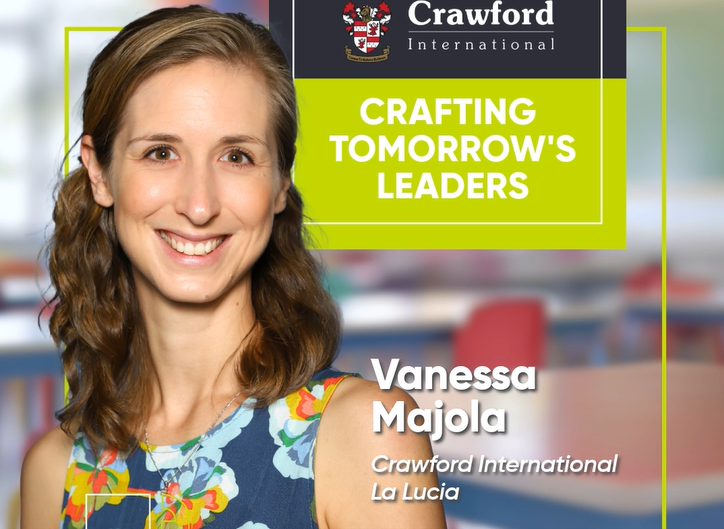Parenting Advice - Growing Money Smartly
ADvTECH Group • January 7, 2022
Parenting Advice - Growing Money Smartly.

Teaching our children about money is a balancing act, especially in South Africa! On the one hand, we try not to make our children's lives all about material goods and money. On the other hand however, money sure does make the world go round and it’s never too early to teach your kids the fundamentals of money to prepare them for the future. Here are some age-appropriate money concepts that Crawford International families can teach their kids.
Ages 03 - 05
What to say: If you do something or make something, you can get money for it. This is called a job and getting money to do that job is called ‘earning’.
Activity idea: Job hunt!
Walk through your Crawford International Campus with your child and point out people who are working, such as the teacher, the cleaner, the canteen chef, or the coach. Talk about HOW those people earn money. You could do the same at your local shopping centre.
Mind your own business: Entrepreneurship
You can introduce your children to the concept of entrepreneurship. Teach them about people who start their own businesses and how they pay themselves. Encourage your child to think of their own cool business and how they can make money from it.
Example:
Name and age: Aaron, age 6.
Business idea: A bicycle shop.
Name of the business: Rides.
How the business would make money: "I would fix bicycles. And sell some new ones, too."
Concept: Saving
What to say: When you have to wait for a turn on the trampoline or you are looking forward to a play date at your friend’s house, you will notice that sometimes you have to wait for things you want. When it comes to money, you might not have enough money to get what you want today, but if you keep putting money into your piggy bank, one day you will have enough to buy whatever you want. It's called 'saving'.
Activity idea: Make the bank!
Help your child make his or her own piggy bank. Follow these instructions for some ‘saving’ fun:
- Take an empty 2-litre cold drink bottle.
- Cut it in half and slide the bottom half into the top half.
- Make a slit at the top of the bottle. (for the moolah)
- Spray paint the bottle pink.
- Spray the bottle lid pink and stick it on for the nose.
- Glue on some googly eyes, paper ears and tail and other lids for the feet.
Concept: Shopping
What to say: When you shop, you need to see what items are things that you need and what items are things that you want. Things you need must always be the first things you buy. Buying things you want before things you need can leave you in a tricky situation...think of toilet paper, for instance!
Activity idea: Shop!
Let your child be in charge of shopping for three items that you NEED and three items that you WANT. See how in-touch your children are with necessities and wants.
Also, if you have some money lying around the house (ja right!), let your child sort through the different coins and notes. They must identify the money, group them together and then add them up.
Ages 06- 12
In this age category, you can teach day-to-day habits that will eventually shape how they earn, save, and shop.
Concept: Earning
What to say: Kids can ‘earn money’ through an allowance or by doing odd jobs for the family or for friends, but it is important to talk to them about what they intend to do with the money they have earned. If it's all ‘spend, spend, spend’ then you know that they need a little guidance.
Activity idea: Save or spend wisely.
Pretend that your child has received R200 as a gift. Ask your child what they will do with that money. There are two outcomes we are looking for here:
1. Saving – maybe they will choose to spend half and save half, and this could be rewarded. Some parents match what their child has saved as a savings reward.
2. Entrepreneurship – encourage your child to use the R200 to make more money!
Example:
Name and age: Tazzie, age 12.
Business idea: Cookie business.
Name of the business: Tazzy Sweet Treats.
How Tazzy Sweet Treats will turn R200 into R640: "I used the money to buy ingredients, then made some Valentine’s Day biscuits and iced people's names on them. I sold 32 biscuits at R20 each. I made R640!"
Entrepreneur!
Concept: Saving.
What to say: You want it, you buy it.
As parents we need to stop the instant gratification. Don't run out and buy what your child wants when they want it – you are not teaching them anything about finances nor about valuing items that they worked for and bought themselves. Give your child a sense of accomplishment by working towards a goal.
Activity idea: Delayed gratification!
Establish something your child wants, which is the reward. Set up a rewards chart that relates to money. The rewards chart should have random jobs on it, and a monetary value assigned to each job.
Your child can bid to do that job, and you can accept. Once they have done that job, they get paid. Once they have done all the jobs and earned all the money, they can buy their own reward!
Concept: Shopping
What to say: Product competition! Which product is best based on price and quality, and how much could you save with better choices?
Activity idea: Shop online!
Let your child do online shopping with you. They can compare prices from the comfort of their home and they can see the savings on the shopping list immediately.
Concept: Borrowing
What to say: If you borrow money, you have to it pay back, plus more – this is called ‘interest’.
Discussion: Working against your ‘savings’ lesson, kids at this age can also understand credit cards and interest. Speak to them about instant gratification and if they want something right now, you will "lend" them the money immediately, but they will need to pay it back with interest.
Help them work out how much the item would cost if they saved for it, and how much it would cost on credit with interest and then let them make the decision. The big lesson will come when they get their allowance, and you take it all back because of interest, and so they can't go to the movies with their friends.
If you allow them to fall into more debt than they can repay, then you may have to repossess their bed to make a point (only kidding, but a fact of finance).














